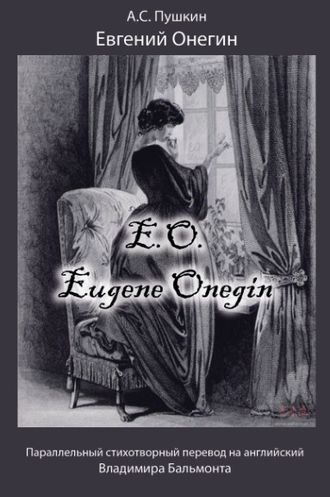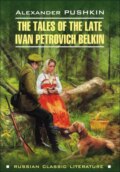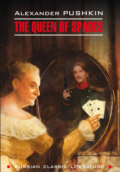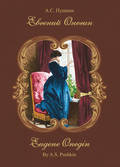
Александр Пушкин
Евгений Онегин / Eugene Onegin
XVII
Но чаще занимали страсти
Умы пустынников моих.
Ушед от их мятежной власти,
Онегин говорил об них
С невольным вздохом сожаленья.
Блажен, кто ведал их волненья
И наконец от них отстал;
Блаженней тот, кто их не знал,
Кто охлаждал любовь – разлукой,
Вражду – злословием; порой
Зевал с друзьями и с женой,
Ревнивой не тревожась мукой,
И дедов верный капитал
Коварной двойке не вверял.
XVIII
Когда прибегнем мы под знамя
Благоразумной тишины,
Когда страстей угаснет пламя
И нам становятся смешны
Их своевольство иль порывы
И запоздалые отзывы, –
Смиренные не без труда,
Мы любим слушать иногда
Страстей чужих язык мятежный,
И нам он сердце шевелит.
Так точно старый инвалид
Охотно клонит слух прилежный
Рассказам юных усачей,
Забытый в хижине своей.
XVII
More often, minds of my hermits
Were by the passions entertained;
Having escaped from stormy torments
Onegin usually conveyed
These talks with sighs of consolation.
Blessed is who witted exaltation,
But then resigned with no regret,
More blessed, who never new all that,
Who chilled his love by a departure,
The grudge– by gossip, and sometimes
With friends and wife could not hold sighs,
Who never suffered jealous torture,
Who did not play and never tried
His grandpa’s wealth to deuce confide.
XVIII
When we shall resort at a banner
Of wise and reasonable calm,
When passions and excitement fever
Will die, and we shall see just fun
In bursts of willfulness and passions,
Belated judgements and reactions, –
Not free of efforts and submissive
We, sometimes, would prefer to listen
To others’ rebel passions whirling.
It stirs emotions in the heart,
Like staying always in his hut
An olden crippled man is turning
Attention to the young men’s tales
Being forsaken for long days.
XIX
Зато и пламенная младость
Не может ничего скрывать.
Вражду, любовь, печаль и радость
Она готова разболтать.
В любви считаясь инвалидом,
Онегин слушал с важным видом,
Как, сердца исповедь, любя,
Поэт высказывал себя;
Свою доверчивую совесть
Он простодушно обнажал.
Евгений без труда узнал
Его любви младую повесть,
Обильный чувствами рассказ,
Давно не новыми для нас.
XX
Ах, он любил, как в наши лета
Уже не любят; как одна
Безумная душа поэта
Еще любить осуждена:
Всегда, везде одно мечтанье,
Одно привычное желанье,
Одна привычная печаль.
Ни охлаждающая даль,
Ни долгие лета разлуки,
Ни музам данные часы,
Ни чужеземные красы,
Ни шум веселий, ни Науки
Души не изменили в нем,
Согретой девственным огнем.
XIX
But ardent youngsters, it’s no doubt,
Are never ready to concealing
And always eager to let out
Their love, or grief, or other feeling.
A loser in the love affairs,
Onegin heard with a stern face
Sincere cordial confession,
The ardent poet’s self-expression;
Vladimir, when in exaltation,
His soul did artlessly display,
Onegin shortly was aware
Of all his love and adoration –
The story rich in sentiments
With quite familiar contents.
XX
Ah, he did love like nowadays
Nobody by love can be blessed,
Since only poet’s soul still prays
To love and feels its real taste.
Wherever, always the same dreaming,
One and the same familiar feeling,
One and the same and well known sorrow,
No promise to relax tomorrow.
Neither long years of separation,
Nor fell into poetic trance,
Nor beauties of a far off place,
Nor learning fruits, nor inspiration
Could change his soul, the same desire
Was heating it by virgin fire.
XXI
Чуть отрок, Ольгою плененный,
Сердечных мук еще не знав,
Он был свидетель умиленный
Ее младенческих забав;
В тени хранительной дубравы
Он разделял ее забавы,
И детям прочили венцы
Друзья соседы, их отцы.
В глуши, под сению смиренной,
Невинной прелести полна,
В глазах родителей, она
Цвела как ландыш потаенный,
Не знаемый в траве глухой
Ни мотыльками, ни пчелой.
XXII
Она поэту подарила
Младых восторгов первый сон,
И мысль об ней одушевила
Его цевницы первый стон.
Простите, игры золотые!
Он рощи полюбил густые,
Уединенье, тишину,
И Ночь, и Звезды, и Луну,
Луну, небесную лампаду,
Которой посвящали мы
Прогулки средь вечерней тьмы,
И слезы, тайных мук отраду…
Но нынче видим только в ней
Замену тусклых фонарей.
XXI
To Olga since the adolescence,
When he hadn’t learned love tortures, yet,
He used to be a witness pleasant
Of her young plays, and moved by that
In leafy forest’s saving shades
He shared with her the youthful plays.
For neighbors, friends and both their dads
They were for marriage candidates.
Being naïvely nice like fairy,
In wilderness, in charming calm,
And by the view of dad and mum
She bloomed like lily of the valley,
Which was not touched in grass’s wilds
Neither by bees nor butterflies.
XXII
She was that one who had inspired
The poet’s raptures first delight,
And animated in his mind
The virgin moan of dreaming pipe.
Farewell to you, the golden plays!
He fell in love with forests’ shades,
Seclusion, loneliness and quiet,
The Stars, and Moon, and Magic Night.
The Moon – night sky illumination,
Which called us to the night time strolls
In dark among the forest’s walls,
Provoked the tears, brought consolation…
But now, when looking at its face,
We think, you’re nice, since lamp replace.
XXIII
Всегда скромна, всегда послушна,
Всегда как утро весела,
Как жизнь поэта простодушна,
Как поцелуй любви мила,
Глаза как небо голубые;
Улыбка, локоны льняные,
Движенья, голос, легкий стан,
Всё в Ольге… но любой роман
Возьмите и найдете верно
Ее портрет: он очень мил,
Я прежде сам его любил,
Но надоел он мне безмерно.
Позвольте мне, читатель мой,
Заняться старшею сестрой.
XXIV
Ее сестра звалась Татьяна…
Впервые именем таким
Страницы нежные романа
Мы своевольно освятим.
И что ж? оно приятно, звучно;
Но с ним, я знаю, неразлучно
Воспоминанье старины
Иль девичьей! Мы все должны
Признаться: вкусу очень мало
У нас и в наших именах
(Не говорим уж о стихах);
Нам просвещенье не пристало
И нам досталось от него
Жеманство, – больше ничего.
XXIII
She’s always modest and obedient,
And cheery like a morning rise,
With open heart, like poet’s being,
Like kiss of love is sweet and nice.
Her eyes are shining blue like sky;
The flaxen curls and tender smile,
Light movements, lovely voice and waist,
All these adornments Olga has.
But any novel take and read,
And I am sure you will find
A heroine who will remind
Olga’s sweet image; it’s, indeed
Makes me annoyed, and not to pester
I’m switching to the elder sister.
XXIV
Tatiana was her sister’s name…
For tender verses it’s uncommon,
But I shall bring to it new fame
And sanctify by tender novel.
It’s sonorous and nice, no doubt,
When hearing it I think about
The mysteries of olden years
And maidens’ room; yet, I confess,
The native morals are corrupted
Affecting Russian names, as well
(And rhymes, so far as I can tell);
From education we’ve adopted,
Just airs and graces, nothing else,
The real learning they replace.
XXV
Итак, она звалась Татьяной.
Ни красотой сестры своей,
Ни свежестью ее румяной
Не привлекла б она очей.
Дика, печальна, молчалива,
Как лань лесная боязлива,
Она в семье своей родной
Казалась девочкой чужой.
Она ласкаться не умела
К отцу, ни к матери своей;
Дитя сама, в толпе детей
Играть и прыгать не хотела
И часто целый день одна
Сидела молча у окна.
XXVI
Задумчивость, ее подруга
От самых колыбельных дней,
Теченье сельского досуга
Мечтами украшала ей.
Ее изнеженные пальцы
Не знали игл; склонясь на пяльцы,
Узором шелковым она
Не оживляла полотна.
Охоты властвовать примета,
С послушной куклою дитя
Приготовляется шутя
К приличию, закону света,
И важно повторяет ей
Уроки маминьки своей.
XXV
Thus, elder sister’s name Tatiana.
The same amaze she could not rise
As did the pretty charming minor,
Could not by same attraction prize.
She’s given to reflection, shy,
Like fallow deer when followed by,
And in the parents’ native home
Looked like not being of their own.
To show caress she hardly could
Neither to mother, nor to father,
Being a kid in children’s crowd
To jump and play she scarcely would.
And used in solitude to stay,
At window sitting all the day.
XXVI
Pensiveness was her best girlfriend
From very days of lullaby,
By dreams she used to decorate
The country’s idleness calm fly.
The mollycoddled fingers even
Didn’t ever touch a sewing needle,
She never knew how to make lace
To pattern cloth with silky trace.
A thirst for ruling over omen:
With an obedient doll the girl
In jest prepares to play her role
In the high life, how to be formal,
And after mother repeats
The lessons of the public treats.
XXVII
Но куклы даже в эти годы
Татьяна в руки не брала;
Про вести города, про моды
Беседы с нею не вела.
И были детские проказы
Ей чужды; страшные рассказы
Зимою в темноте ночей
Пленяли больше сердце ей.
Когда же няня собирала
Для Ольги на широкий луг
Всех маленьких ее подруг,
Она в горелки не играла,
Ей скучен был и звонкий смех,
И шум их ветреных утех.
XXVIII
Она любила на балконе
Предупреждать зари восход,
Когда на бледном небосклоне
Звезд исчезает хоровод,
И тихо край земли светлеет,
И, вестник утра, ветер веет,
И всходит постепенно день.
Зимой, когда ночная тень
Полмиром доле обладает,
И доле в праздной тишине,
При отуманенной луне,
Восток ленивый почивает,
В привычный час пробуждена
Вставала при свечах она.
XXVII
But even in the adolescence
Tatiana didn’t take dolls on hands
And never used to give them lessons
Or tell the news or fashion trends.
And in the pranks and children plays
She wasn’t involved, but loved the tales,
Which made excited and were fearful,
When being told at night in winter.
And when the nanny used to gather
The Olga’s little friends to play,
The race-and-catch or other game
On a capacious sunny meadow,
She didn’t enjoy the loud noise,
The ringing laugh and careless joys.
XXVIII
She loved to greet a summer dawn,
Forestall a sunrise on a terrace,
When on the pale-blue heavens’ dome
Diminishes the stars’ appearance,
Lightens the border of the Earth,
And wind, the morning sunrise worth,
Like herald blows – the day comes in.
In winter, when the days are thin,
A shade of night is calmly slipping,
And in the silent idle quiet
Under a faded dim moon light
The lazy East for long is sleeping,
She woke up at a usual time
In the twilight of candles’ shine.
XXIX
Ей рано нравились романы;
Они ей заменяли все;
Она влюблялася в обманы
И Ричардсона и Руссо.
Отец ее был добрый малый,
В прошедшем веке запоздалый;
Но в книгах не видал вреда;
Он, не читая никогда,
Их почитал пустой игрушкой
И не заботился о том,
Какой у дочки тайный том
Дремал до утра под подушкой.
Жена ж его была сама
От Ричардсона без ума.
XXX
Она любила Ричардсона
Не потому, чтобы прочла,
Не потому, чтоб Грандисона
Она Ловласу предпочла;
Но в старину княжна Алина,
Ее московская кузина,
Твердила часто ей об них.
В то время был еще жених
Ее супруг, но по неволе;
Она вздыхала о другом,
Который сердцем и умом
Ей нравился гораздо боле:
Сей Грандисон был славный франт,
Игрок и гвардии сержант.
XXIX
She liked the novels since her young,
They opened universe to her,
And she preferred illusions’ tongue
Of Richardson and J. Russo.
Her dad was always nice and straight,
In the passed century delayed;
Be ware of books he had no ground
And never reading them had found
That they were just a hollow toy.
He absolutely did not mind,
What was that secret volume kind,
Which his shy daughter did enjoy.
So far as for his pleasant wife,
She was with Richardson in love.
XXX
Yes, she was fond of Richardson
Not thanks to his great novels reading
And, thus, preferring Grandison
To Lovelace hiding secret feeling.
Her Moscow cousin, young princess
Alina, who had read it, yes,
Told her of that, and just because
Her future spouse at that time was
Her suitor, whom she didn’t adore,
And she was sighing for a guy,
Who was more clever and less shy,
Whom she preferred and adored more.
This Grandison was brave and smart,
A gambler and a sergeant guard.
XXXI
Как он, она была одета
Всегда по моде и к лицу;
Но, не спросясь ее совета,
Девицу повезли к венцу.
И, чтоб ее рассеять горе,
Разумный муж уехал вскоре
В свою деревню, где она,
Бог знает кем окружена,
Рвалась и плакала сначала,
С супругом чуть не развелась;
Потом хозяйством занялась,
Привыкла и довольна стала.
Привычка свыше нам дана:
Замена счастию она.
XXXII
Привычка усладила горе,
Неотразимое ничем;
Открытие большое вскоре
Ее утешило совсем:
Она меж делом и досугом
Открыла тайну, как супругом
Самодержавно управлять,
И всё тогда пошло на стать.
Она езжала по работам,
Солила на зиму грибы,
Вела расходы, брила лбы,
Ходила в баню по субботам,
Служанок била осердясь –
Все это мужа не спросясь.
XXXI
Like him she used to be attired
In modern fashion, looking fine;
Though, wedding was against desire,
It was by parents sanctified.
To dissipate his spouse’s mourn
The clever husband very soon
Left to the country, where she found
Herself in Lord knows what surround.
She rent her hair and wept, at first,
But then, by household distracted,
And being by the life affected
She with her husband didn’t divorce.
We all get habit from above,
And it replaces good and love.
XXXII
The habit pacified her mourn,
Which by no means could be repulsed,
A remedy she found soon,
Which resurrected her at last.
Thus, switching business and pastime
She managed a smart hold to find
How to control like does a reign
The husband and to give away
Her mourn. And she was spending days
Inspecting works and keeping records,
Arranging pickling, shaving recruits,
Enjoying baths on Saturdays;
She beat her maids for the omissions
And never asked for spouse permissions.
XXXIII
Бывало, писывала кровью
Она в альбомы нежных дев,
Звала Полиною Прасковью
И говорила нараспев,
Корсет носила очень узкий,
И русский Н как N французский
Произносить умела в нос;
Но скоро все перевелось;
Корсет, Альбом, княжну Алину,
Стишков чувствительных тетрадь
Она забыла; стала звать
Акулькой прежнюю Селину
И обновила наконец
На вате шлафор и чепец.
XXXIV
Но муж любил ее сердечно,
В ее затеи не входил,
Во всем ей веровал беспечно,
А сам в халате ел и пил;
Покойно жизнь его катилась;
Под вечер иногда сходилась
Соседей добрая семья,
Нецеремонные друзья,
И потужить и позлословить
И посмеяться кой о чем.
Проходит время; между тем
Прикажут Ольге чай готовить,
Там ужин, там и спать пора,
И гости едут со двора.
XXXIII
It happened that instead of ink
She by her blood the albums signed,
She named Praskov’ya Paulin,
And spoke singsong and deeply sighed;
She wore the corsets fitted tight
And Russian N in French did write;
When saying words, she nasalized;
But soon all that was finalized;
The corset, Album and Alina,
A copybook with touching rhymes
She had forsaken in past times,
Backed to Akul’ka from Selina
And finally decided that
It’s time to change the robe and hat.
XXXIV
The husband loved the sweetheart deeply,
Didn’t pay attention to her deals,
And trusting to the wife completely
In an old robe appeared to meals.
His life in calm and peace was streaming:
Sometimes, before the coming evening
Informal family of guests
In manor-house congregates
To mourn, to laugh, to title tattle
About passed and current life,
And when in parlor clock chimes five,
To order Olga tea, and later
A supper follows, say good night,
The guest are leaving satisfied.
XXXV
Они хранили в жизни мирной
Привычки милой старины;
У них на масленице жирной
Водились русские блины;
Два раза в год они говели;
Любили круглые качели,
Подблюдны песни, хоровод;
В день Троицын, когда народ
Зевая слушает молебен,
Умильно на пучок зари
Они роняли слезки три;
Им квас как воздух был потребен,
И за столом у них гостям
Носили блюда по чинам.
XXXVI
И так они старели оба.
И отворились наконец
Перед супругом двери гроба,
И новый он приял венец.
Он умер в час перед обедом,
Оплаканный своим соседом,
Детьми и верною женой
Чистосердечней, чем иной.
Он был простой и добрый барин,
И там, где прах его лежит,
Надгробный памятник гласит:
Смиренный грешник, Дмитрий Ларин,
Господний раб и бригадир
Под камнем сим вкушает мир.
XXXV
And they retained in calm and peace
The customs of the ancient time,
And during Russian Shrovetide feast
The oily pancakes used to fry.
Twice yearly fast they used to keep,
The round swings they liked to swing,
Loved to hear singing during lunch
And Whitsun round dances much,
And yawning listened to a prayer;
Compassioned, on a bunch of herb
Three tears by each they used to drop,
And kvass like air was necessary,
And at the table to the guests
The dish(e)s were served complied with ranks.
XXXVI
And that’s how they were growing old.
The husband first reached fatal limit,
Stepped over the Beyond threshold
And left the other world to visit.
He died before the time for lunch,
Was by the neighbors bemoaned much,
By children and his faithful wife,
Who shared with him the happy life.
He was a straight and kind lord,
And at a place his ash was laid
A mournful monument proclaimed:
Here Dmitry Larin – slave of God,
A brigadier and fair landlord,
Enjoys in peace the Great Beyond.
XXXVII
Своим пенатам возвращенный,
Владимир Ленский посетил
Соседа памятник смиренный,
И вздох он пеплу посвятил;
И долго сердцу грустно было.
«Poor Yorick! – молвил он уныло, –
Он на руках меня держал.
Как часто в детстве я играл
Его Очаковской медалью!
Он Ольгу прочил за меня,
Он говорил: дождусь ли дня?..»
И, полный искренней печалью
Владимир тут же начертал
Ему надгробный мадригал.
XXXVIII
И там же надписью печальной
Отца и матери, в слезах,
Почтил он прах патриархальный…
Увы! на жизненных браздах
Мгновенной жатвой поколенья,
По тайной воле провиденья,
Восходят, зреют и падут;
Другие им вослед идут…
Так наше ветреное племя
Растет, волнуется, кипит
И к гробу прадедов теснит.
Придет, придет и наше время,
И наши внуки в добрый час
Из мира вытеснят и нас!
XXXVII
After return to hearth and home,
Vladimir Lensky came to visit
His neighbor’s sorrowful gravestone,
And heaved a sigh, when he did see it.
And for a long time he was sad.
“Poor Yorick – dolefully he said, –
He hold me on his hands sometimes,
I used to play with his war prize –
A medal he got from Suvorov!
Intended Olga he for me,
And used to say: when would it be? ”
And stirred by a sincere sorrow
Vladimir started to inscribe
A madrigal at the graveside.
XXXVIII
And at the same place memorized
His parents by the filial tears
And weepy verses had inscribed
Being embraced by fatal fears.
The generations make a round,
Sprout out, mature and fade down
Controlled by Providence’s will;
Their issue follows same routine…
Thus, we, today in bloom and silly,
Grow up, enjoy, boil up and swing,
The ancestors to coffins bring.
But time for us will come, yes, really,
And the grandsons will oust us
And say politely “Bye, grandpas! ”
XXXIX
Покамест упивайтесь ею,
Сей легкой жизнию, друзья!
Ее ничтожность разумею,
И мало к ней привязан я;
Для призраков закрыл я вежды;
Но отдаленные надежды
Тревожат сердце иногда:
Без неприметного следа
Мне было б грустно мир оставить.
Живу, пишу не для похвал;
Но я бы, кажется, желал
Печальный жребий свой прославить,
Чтоб обо мне, как верный друг,
Напомнил хоть единый звук.
XL
И чье-нибудь он сердце тронет;
И, сохраненная судьбой,
Быть может, в Лете не потонет
Строфа, слагаемая мной;
Быть может (лестная надежда!),
Укажет будущий невежда
На мой прославленный портрет
И молвит: то-то был поэт!
Прими ж мои благодаренья,
Поклонник мирных Аонид,
О ты, чья память сохранит
Мои летучие творенья,
Чья благосклонная рука
Потреплет лавры старика!
XXXIX
So far, do revel your existence
And easy life, my novel’s friend!
I recognize its worthless essence
And am not scared to see the end;
My eyelids for illusions dropped,
But sometimes distant signs of hope
Disturb my heart: I realize
That it’ll be sad not recognized
To leave this world without traces.
I live and write not for a praise,
But, probably, want to amaze
The world and reveal real graces.
I hope the rhymes I’ve left behind
Will of the poet’s life remind.
XL
And they will touch somebody’s heart,
And being cared by lucky fate
The strophes and rhymes, which now I write,
Will not be lost in later date;
And I believe (myself I flatter!)
The issue will retain my letter,
Seeing my portrait, reading name
“He was the Poet! ” they will say.
Thus, please, accept my real thanks
A fan of peaceful Aonides,
I greet the one who’ll recognize
My flying poetry’s attempts,
Whose thankful favorable hand
Will pet the laurels of old man!






